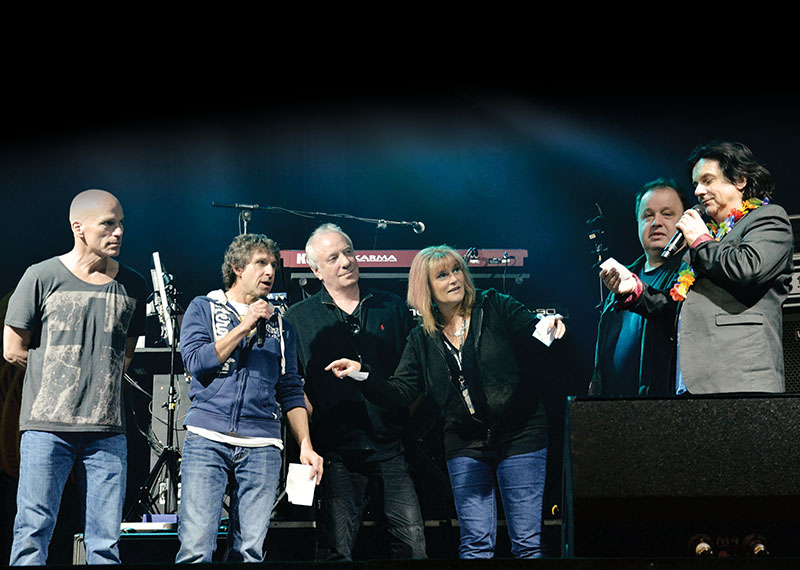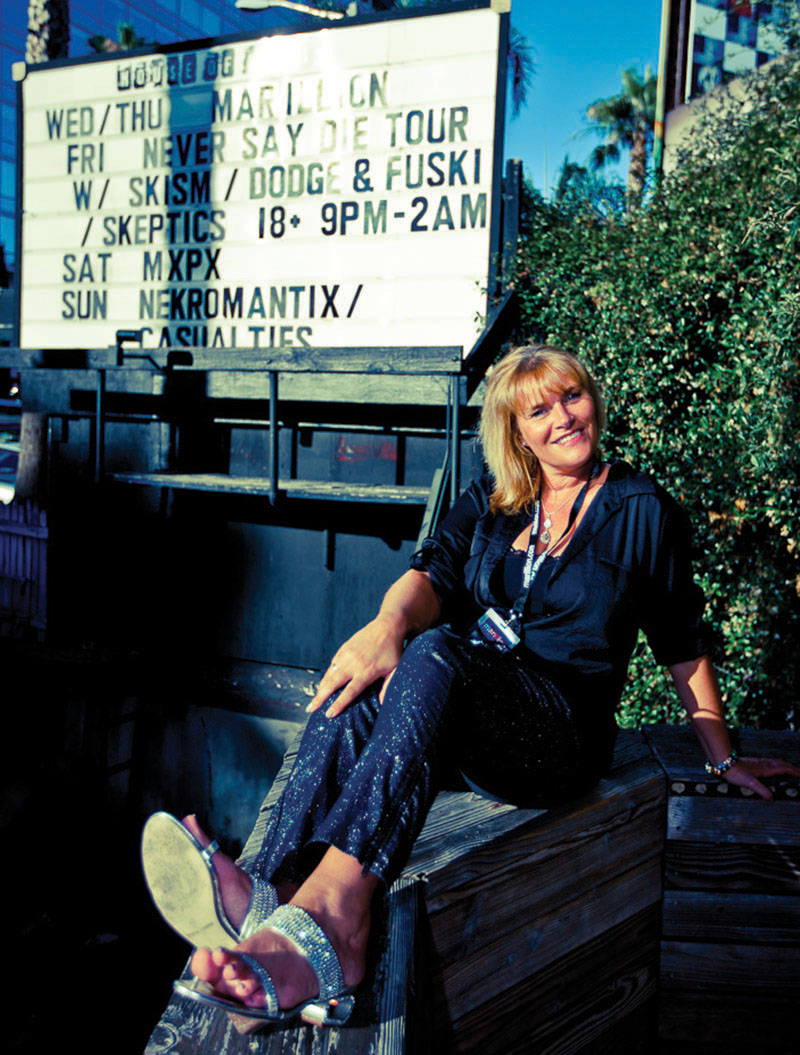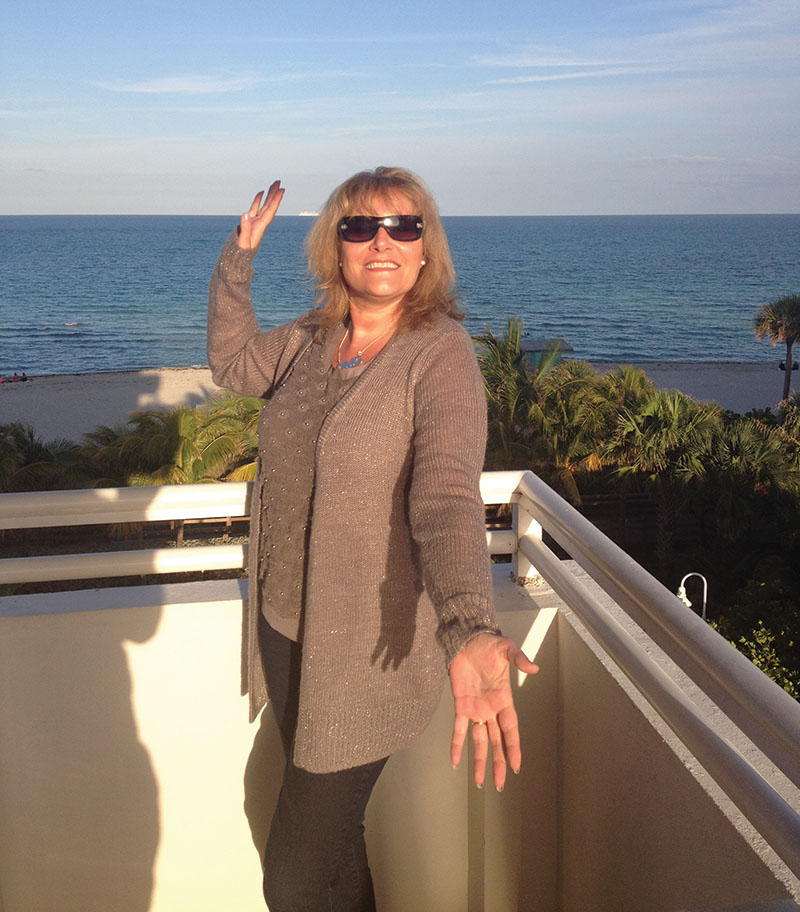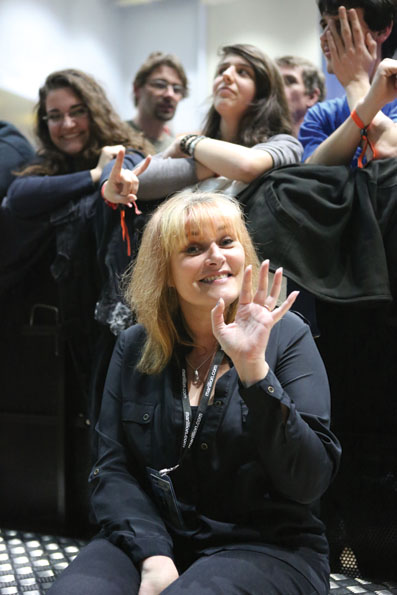
A: Obviously, Marillion were at the forefront of using the internet. The front line of that now seems to be Social Media and you are the front person for that. How does that work? How does it benefit the band and how does it fit into your working day?
L: Social Media is really important to the band because it’s a quick and very easy way of communicating with people. Facebook can be a pain because we have about 250,000 ‘likes’ on our Facebook page. Just because I post something doesn’t mean that 250,000 people will read it. They use complicated algorithms that let more people see your post if a lot of people ‘Like’ it or ‘Share’ it. If you want everyone to read it you have to pay. I appreciate Facebook is a business and they have got to make money, and I don’t mind paying, but what they want you to pay isn’t reasonable. If they asked for £40 or £50 to boost every post I would pay for every single post. But it works out at £300-£400 per post. Sometimes we will boost them, but only if they are really important posts. We try to put in as much information in the posts as possible so that your £400 is well spent. So you don’t want to just say, “Oh we’re doing a gig in London,” for instance. We would want to tell people that we were playing London, Manchester and everywhere else so that more people would read it.
It’s like Herding cats or like trying to get giant pandas to mate
So I have my niggles with social media. There are also some very scary people on the internet too. But it is very important and it’s good for the fans to be able to react to things we say and do. Sometimes we ask a question that really helps us with planning a gig or an item of merchandise because people give you answers. I include the Marillion Forum as part of social media. We try and use Twitter, YouTube, Facebook and our Marillion on-line Forum. We do still send the E-Webs to our mailing list, but they are not as immediate in terms of response. Also we don’t like to send too many because people are very precious about email and don’t like to receive too many. So maybe once a fortnight we will send
an email.
A: And are you able to filter out the feedback you want to use as opposed to the feedback of the vocal minority?
L: In what respect?
A: I’m thinking there are some people who are a lot more vocal than others and will give you their opinion on everything.
L: Oh, I see.
A: And will not like opposing opinions.
L: I’ve been doing this so long now. I have been working for Marillion for almost 15 years and I’ve learnt that there are some people who cry wolf all the time and I just ignore them. Then there are people who never say a bad word about Marillion, so when they do I sit up and take notice. You learn who tells you what they think you want to hear. I think on my own ‘Lucy Jordache Marillion’ page, people are fairly honest with me because they know I am deliberately not friends with any member of the band on it, I wanted it to be a place where people could be honest with me. Sometimes you feel that if they knew Steve Rothery was going to be reading it, for example, they might be inclined not to be as honest in voicing their opinion.
A: Putting you on the spot, but can you give me an example of something you’ve changed, whether you’ve changed a product or tactic in response to social media.
L: Setlists. I knew that I wanted to hear Trap the Spark and h wanted to play it but the rest of the band was hesitant. But I was able to point out that I had read a lot on social media that Trap the Spark was a song that lots of fans wanted to hear. So I put that forward. You know we’re often all together in the studio downstairs and talking about something and one of the band will say something like, “Well I think the fans would want such and such...” I run back upstairs to my office and I ask the question on social media and you can guarantee that within half an hour I have had something like 200 replies. Then I go back downstairs and I can say, “Right from these 200 fans this many people like this or like that.” We do use it in that way. People also make suggestions and I go off and research it and look at the feasibility of it. Whether it happens immediately or happens a couple of years later, things I read on social media plant seeds in my head.

A: Let’s talk about ‘Lucy’s Questions’
L: I do this thing called Lucy’s Questions every Friday. People were always asking me questions so I formed a Facebook Group. So every Friday I take questions. I think there are a thousand members now, which is great.
People ask things from as simple as when the download of a certain show will be up to “Have you got any plans for the next album?” I’m pretty honest on there. I don’t tell everyone everything, because sometimes we want to keep things secret for a while. I do try and answer people’s question. Only if I know that answer of course! Some people ask things like, “What’s Steve Hogarth’s favourite song?” I don’t know; that’s not really what the Friday Questions is there for.
A: With this big online and social media presence how much time does it take out of your day, and does it distract you from all the other stuff you do?
L: No. I couldn’t quantify how much actual time it takes. Facebook is always one of the tabs open on my computer. To be honest I usually pop in there for a bit of distraction if I’m doing something like a complicated spreadsheet or doing something that is making my brain hurt. I will pop on to Facebook for half an hour to un-muddle my brain for an hour. So it doesn’t distract me and it doesn’t take long. It’s a small but important part of my job.
A: Have you managed to quantify the good that it does the band to have such an online presence?
L: I don’t know is the answer. In my job there are many things that are not quantifiable. When we do a tour for example and we take out advertising you can’t say that it was the adverts that sold more tickets or whether it was people in general had more money to spend at that time. That’s why they bought tickets but maybe hadn’t for the last tour. Maybe their own personal circumstances had changed. Maybe they liked that album more than the previous one. It’s really hard to quantify. We try to take a little of everything and throw it out there.
There are things that we do such as the free Crash Course CD , so for instance after the festival in Quebec this summer we had about 50 people come to the website and apply for a free CD who lived in Canada. You can pretty much bet that it was because they came to the Festival of Quebec. I can follow that up in about 6 months and can see if they bought anything else after the free CD. Those kinds of things you can quantify. If I do a post on its own, such as put a post on Facebook about putting tickets on sale, I’ll obviously be able to see straight away that we’ve been able to sell lots of tickets. But if we are doing lots of different things you can’t say which is which.
A: So you’ve got all this social media stuff going on, but that’s only a small part of your job. Apart from that, I’ve heard your job described as being like
herding cats.
L: Herding cats or like trying to get giant pandas to mate. There are 5 members of the band and there are 3 full time staff and Stephanie, who’s part time. Everyone has their own job to do. But I am in charge of everyone. I oversee the whole picture. So you’ve got Rich, Simon and Stephanie all doing what they do, but I have to make sure I know what they are doing and give advice or help out.
A: When you started you were referred to as the Media and Communications Manager. Does that term still apply, or has it widened?
L: No. My official title for the last 4 or 5 years has been ‘Co-Manager’. The reason I am the Co-Manager of Marillion is that the other Co-Managers are the 5 members of Marillion. This means that we all make decisions together. With important decisions usually I have gone off, researched it, done the spreadsheets, done the budgets and everything. Then I present it to the band and say this is what I think we should do. They say yes or no. 9 times out of 10 they say yes, thank goodness. Sometimes on the 1 out of 10, we sit and argue about it for a while. One of the band might throw in a different point of view, so I go off and look at that. When the band lured me away from EMI their exact words were, “We want you to come and work for us. We don’t know what we need you to do, but we want you to work for us. Doing press, doing stuff.” It sounds ridiculous now, but then I thought ‘Alright then! Why not?’ Within 6 months of me starting working for them they said that they had fired their agent and our promoter, and asked me to start booking some gigs for them. I said, “Well how do I do that?” They just said, “You’re quick. You’ll learn.” So I did. I phoned up a few people I knew and asked them how to do it. So my job was growing all the time anyway.
I’ve learnt things over the years. So now I Co-Manage Marillion but I’m their Agent and I’m their promoter. In some other countries in the world I hire local promoters: in Holland, France and Germany. In South America and North America we have our own Agent. But if they come up with a plan for a tour it all comes to me. I look into it, all the money, do a spreadsheet. Once I’m happy with it I take it to the band. So my job is bigger than what a normal manager does. I have a good quote on what a manager does, “A manager guides your career by advice and direction and handles business matters.” So that’s all a manager’s supposed to do (Laughs). You can see I do a lot more than that. I do a lot of Excel spreadsheets and budgets, because we have to keep the money coming in to pay everybody’s wages, whether it’s a new piece of merch or playing
a gig.
When we get offered a gig, I do a spreadsheet, work out the profit and loss on the gig. And, to be honest, if it’s not going to lose us any money at all we will generally go and do it. Every gig is worthwhile. People were asking why we did the cruise for example. There were a few things about that on social media. “Why are you doing that? You’ve sold out”. Well there were three reasons. The first reason was the money was right. But the money wasn’t the whole reason to go. Believe me we have been offered a hell of a lot of money to do some things that we have turned down. It was also the fact that for the band that it was an experience that none of them had had before and they wanted to have a new experience, and why shouldn’t they? The third reason was it was done to our standard; they would get the PA that we wanted, the mixing desk we wanted, so we felt in control. So I don’t see why some people thought we were selling out?
A: What feedback and what new people did the cruise pull in?
L: We did have quite a few people asking for the Crash Course CD who lived in America. That was straight after Cruise to the Edge. So you can only presume they were on the cruise. On the Cruise to the Edge Facebook page there were lots of comments like, “Wow! I’ve never seen Marillion before and they blew me away!” So that was really good. So, even if a few of those people go on to buy our albums what harm has it done? Nothing! The band had a new experience. What’s not to like?
A: The other thing that Marillion has done in recent history is they started collaborating with other acts. I’m thinking of the Deep Purple support and the Saga double header tour, The Cruise and other festivals. With the whole Prog genre coming back in a big way do see other collaborations as a way forward?
There’s not much love in the media for Marillion. But then again I don’t think there’s much love in the media for anyone, unless you’re a superstar
L: We did a press release for Anoraknophobia all the way back in 2001 where we were perceived by the fans as to be slightly negative about progressive rock. They seem to have held it around our necks like an albatross ever since. They have the perception that Marillion hate prog rock. We never said that! It was meant to be that there is more to Marillion than progressive rock, which I still stand by. If an opportunity comes up, such as with Deep Purple and with Saga we’re not going to say no. We won the best band at the Prog Awards. We love Prog Magazine. If that’s how some people want to pigeonhole the band, as just Prog, then that’s fine. We know we’re more than just Prog. We don’t dislike prog, we love it. But we are just as much of a part of lots of other genres too. I always think that Marillion should be part of a genre of their own. I like all types of music. I don’t just like Prog. I like Rock. I like Pop. A good tune is a good tune. So if an opportunity comes to us we will look at it. If it works, we’ll do it. The Deep Purple tour was really good fun. Again, hard to quantify if it did any good immediately but it’s also that thing of keeping Marillion’s name out there.
A: Is there anything like that coming up that you can tell
us about?
L: No there isn’t anything. The plans for the next 2 years are to spend the rest of the year writing the new album, do the Christmas tour, come back after Christmas and then the band will jam in the mornings and then they’ll rehearse in the afternoon for the Marillion Weekends. Then straight after that for May, June and July they will be writing; hopefully maybe even starting to record. They’ll probably go down to Real World Studios a couple of times in the summer to do concentrated writing sessions. At some point before next summer we will be announcing details of a very special pre-order campaign. I can’t give you the details at the moment, but it is going to be very special. It’s going to be bigger, better and more fabulous than anything we’ve ever done in the past. The fans will feel included. They will feel part of the process. We hope they get as excited by it as we do. Then September or October...ish hopefully they will be writing. So the rest of 2015 will be spent finishing off the album. We hope in early 2016 we will have a finished album. We will actually have time to put it together and market it properly. The last few albums have been such a rush because they have breached the deadline.
This time I’d like the album delivered at the beginning of 2016 so we can release it properly, have a solid marketing campaign, have a long build up with concentrated promo and press. I’m putting that together now. I’ve started talking to media companies. It’s really not that far away. It will come round really quickly. Then hopefully we will release the album and in no particular order we will tour South America, North America and Europe throughout 2016 and into 2017. Then, obviously, in 2017 we will be doing the Marillion Weekends again! So really we know what we are doing now through 2017.

A: How long do you think the band will be able to carry on?
L: I think the band will carry on until they drop dead! Because they enjoy it and they like doing what they are doing. We might have to slow down a bit, physically. It depends how their health is. But I think as long as they are healthy they’ll keep doing it. Might have to change to all-seated gigs, including the band! (Laughs). I hope they can carry on for a long time.
A: So, you touched on media, as in the press. There’s been a resurgence in the genres that cover Marillion. In the magazines there is Classic Rock Mag and Prog Mag. How has that benefitted Marillion?
L: I’m not sure it has or hasn’t really. It’s nice to have a magazine that will feature us, which Prog will. But before Prog was around we weren’t in Q or Mojo. They disliked us for some reason. There’s not much love in the media for Marillion. But then again I don’t think there’s much love in the media for anyone, unless you’re a superstar. If you think about the music press: does it really exist anymore? I’m not sure. Do people buy Q Magazine every month? I’m not sure they do . I think a lot of it is online media.
A: But conversely Classic Rock and Prog are doing well.
L: Yes, they’re growing, so it’s great to be supported by them.
A: Was it good to get in on the ground floor with them? I think Marillion were one of the first featured bands.
L: That is nice.
A: How does the press coverage compare around the world?
L: When they play South America they get loads of press. When they play Mexico City for example h will do an interview with their biggest newspaper. So compare that to London. The London Evening Standard wouldn’t cover us. I doubt very much if they would care. So South America is massive. American press sadly don’t seem to care. It’s just the niche stuff, but we’re grateful for that. We used to get a lot more press in Holland. Holland doesn’t seem to rave about us anymore, which is a shame. Europe in general can be hard to get interviews into the press which is why the band has fallen in love with South America to be honest. They get a lot of press. They get a lot of radio, a lot of media coverage. They turn up at the airport and there’s a hundred fans waiting for them. They play to 4,000 people a night and naturally they love it. I wish it could be like that over here. In Europe I do wish that Marillion weren’t totally ignored. But the band just keep their heads down and do what they do. If we get any press it’s a bonus. We learnt not to depend on that years ago.
A: What about CD sales in South America? When Rush went there to Rio they went there not expecting anything as they had hardly ever sold a CD there. They were quite taken aback when they played there that there was such a reaction.
L: We don’t sell that many through Racket Records. With the exchange rate and customs charges it’s a lot for South American fans to pay. No record has been released there domestically for many years, except for the Best Sounds CD that was released recently. I can’t tell you how well that has sold because I haven’t seen the figures yet as it was so recent. However the record companies who handled it were quite pleased. I think they sold a lot on iTunes. They certainly sold a lot on export to fans around the rest of the world who are collectors. So when the figures do come in, it will be hard to see how many we sold to Chile and Brazil or wherever because they sold a lot on export.
A: Does the South American tour finance itself?
L: Yes. How the two South American Tours we’ve done work is that the Agent, Paulo, has come to us with a financial offer that includes flights and hotels. Therefore it’s easy to work out as all we have to pay is for the crew and for incidentals. There aren’t huge profits, but then again it’s worth doing because it’s growing each time they go. I’m convinced when we go back again they’ll be able to play in bigger arenas. And again it’s that thing that if you are getting older, (sorry to the band if any of them are reading this!) you want experiences like that. You want such memories. You read on social media all the fans saying that they had an amazing Marillion Weekend and they have such wonderful memories for the rest of their lives. Well it’s the same for the band. It’s what they want, and they want to keep adding to that too. The Australian fans are always saying, “Please come to Australia”. Believe me; if we could make it happen financially I would like them to do it. They would love to because they’ve never been. What an experience! There are always places like that where they’ve never been but would love to go.
I think the band will carry on until they drop dead because they enjoy it!
At the end of the day though, it’s all down to the spreadsheet. It’s whether it’s financially feasible. Sometimes you’re not going to earn any money: like Cropredy this year. We earned very little for Cropredy once we’d paid all our bills, but it was worth it for the potential exposure. So sometimes you are not going to make any money, you’re not going to lose any money so it’s worth the gamble. So that’s the kind of mantra we live by. But obviously as well, we have to do some things that pay us good money to offset those kinds
of things.
A: Record Companies. What
is your role in getting the album out there in the shops
to people?
L: Well basically just coordinating with the record company. Making sure they do the best job they can. So they send me an email saying we want to do this, what do you think? That type of stuff.
A: What is your role in the Marillion Weekends?
L: As you know the lovely Stephanie Bradley is in charge of all the bookings. My job is to employ all the right people and let them do the work. I just oversee it and keep control of the purse strings. So there is a whole team of people planning the building of the tent, which as you know costs 6 figures to build. So someone has to oversee that and the planning of where the bars, the stage, the rigging, the lights etc is going to go. Then we all work together on the merchandise ideas. We have a team of merchandisers in Holland selling it all. I kind of like my job because I have my finger in many pies, but at the same time it can become overwhelming if you have everyone at once wanting your opinion on what they want to do. Have we got extra money for that? At every Marillion Weekend it will be that something has been underestimated. That won’t cost us just a few hundred pounds it will cost us £10,000. So in my emergency budget I always put at least £10,000 for miscellaneous, and every year it gets used without a doubt.

A: How important financially are the Marillion Weekends?
L: Very important. Holland and the UK are financially imperative. Montreal, sadly, isn’t making us much money anymore. We don’t know why. We’re hoping this year it will buck the trend, but we need to sell at least another 300-400 tickets to make it financially worthwhile.
A: What about the
DVD’s, Blu-Rays etc that come out of the
Marillion Weekends?
L: We seem to sell the same amount of them. We don’t see a growth or decline. So we know how much it costs to film and be mixed and then manufacture it so we know how much money we will make from those releases. We are very grateful for that as well.
A: Is that pattern going to carry on. Are you still going to film?
L: Here’s an exclusive for The Web UK: our plan for the 2015 Marillion Weekends is that we won’t be filming or recording Montreal or the UK. We will be putting all our time and effort into Holland. We will be filming all 3 nights. The Saturday night especially will be really exciting. I can’t tell you what it is but we have spent a lot of money on production. It’s going to be amazing. We are going to release all those 3 at the same time in a box set. It will be way after the fact because Mike will be busy on the new album. Probably 12 – 18 months afterwards. But what we are also going to do is have a film crew to capture the essence of the weekend. They will be filming all the backstage stuff that none of you see. They will make a mini documentary about it.
A separate release will be the best 10 songs throughout the weekend dispersed into a documentary film. That will come out as a ‘thing’ at some point. So that’s quite exciting. We haven’t done that before so it’s quite an interesting way of doing it.
A: The Marbles tour was the last time anything like that was attempted. (Colours and Sounds).
L: Yeah, but it will be much better. This is going to be snappy and interesting. Tim Sidwell is doing it so it will be great. We’re excited about that.
A: One burning question that must be asked. How easy is it to get a decision from the band?
L: (Laughs) Good question, Andy. It depends on how contentious the issue is. Sometimes we go with the majority decision; unless the minority is vehemently opposed because that’s not fair. But if they go with the flow then the majority wins. But in terms of them replying to an email it can take me days to get a straight answer. What I generally do is, when they are in, I will run down after they finish jamming and say, “Right, nobody leave! I need to talk to you for 10 minutes”. I then put the question to them. If they all go yeah, I think fine. Then I come back upstairs to my office and action it. Sometimes I’ve got an idea in my head about something I want to do and I think that it’s going to take me a long time to research it. I’d better just ask in principle if they hate the idea because if they do hate it, then it would be a waste of my time to take it further. They won’t be reading this saying, “How dare she say that!” They know it’s true. But once we get organised and get going it’s great. It’s a lovely team to work with.
A: Was there anything ever that the whole band wanted, that you were against?
L: Happiness is the Road, when we gave the album away on the torrent sites. I was totally against that and didn’t want to do it. The band really did. So I supported them in it because I had to, but I made my feelings quite clear. Luckily it is few and far between that these things arise.
A: Have you ever had to be the referee in a band splitting or staying together kind of decision?
L: Yes. I do try to be referee and see both sides. The trouble is everyone is so passionate. And being musicians they are even more so. Sometimes one of them will say something that will piss someone else off and they really didn’t mean to. Or they have pissed someone off and they did mean to! I like to jump in and try to sort it, especially if an argument starts on email. We all know that it is easy to read an email the wrong way. They are pretty good at having a spat and sorting it out though. They are grown men and they’ve been doing this a long time. It usually blows over quite quickly.
A: There are a lot of solo projects ongoing at the moment. Steve Rothery is doing the Steve Rothery Band album with Kickstarter. H has got his diary out in book form. Pete has many musical sidelines on the go at any time. What is your role in these?
L: With h I help him book his gigs. I helped him with the diaries by reading them before they were published to make sure there wasn’t anything particularly libellous. With Pete and Steve Rothery I haven’t specifically done anything but they know I’m here for them if they want to ask me a quick question. Steve Rothery did the Kickstarter all on his own. He’s very tired at the moment, bless him. But the thing is I am employed by Marillion so I can’t spend a lot of time on their solo stuff. But I’ll always be here
for advice.
Interview by Andy Rotherham. Reproduced from the Autumn/Winter 2014 issue of The Web UK Magazine at the request of Lucy.
< back


